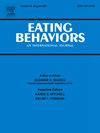Associations between intraindividual variability in weekday-weekend sleep timing and duration and eating disorder pathology
IF 2.4
3区 医学
Q2 PSYCHIATRY
引用次数: 0
Abstract
Sleep disruptions may be risk factors for eating disorder symptoms. However, mean estimates of sleep characteristics may not be ideal metrics, considering many individuals have irregular sleep patterns. Although variability in sleep-wake timing is associated with irregular eating patterns among individuals with eating disorders (Linnaranta et al., 2020), studies of sleep intraindividual variability (IIV) and eating pathology are limited. To fill this gap, we evaluated two indices of sleep IIV from weekdays-to-weekends and their relation to eating disorder risk. The sample was drawn from the 2018–2019 Healthy Minds Study (N = 25,879). We conducted two binary logistic regressions predicting screening positive for an eating disorder from IIV indices, adjusting for depression and mean sleep time. Greater IIVtiming (i.e., greater shifts in the timing of the sleep midpoint between weekdays and weekends) was associated with greater odds of screening positive for an eating disorder (OR = 1.049). Greater IIVduration (i.e., greater shifts in duration of sleep between weekdays and weekends) was associated with lesser odds (OR = 0.967); however, suppressor effects of depression likely explain this finding. Greater mean duration of sleep was associated with lower odds of screening positive for an eating disorder in both models. Results are consistent with theories emphasizing the importance of sleep IIV in conceptualizing psychopathology risk; however, effect sizes were small and may have limited clinical significance. By only asking about mean sleep duration, clinicians may miss other sleep-related predictors of eating disorder psychopathology. Findings support investigating techniques to regularize sleep patterns among people with disordered eating.
求助全文
约1分钟内获得全文
求助全文
来源期刊

Eating behaviors
Multiple-
CiteScore
4.20
自引率
3.60%
发文量
65
审稿时长
60 days
期刊介绍:
Eating Behaviors is an international peer-reviewed scientific journal publishing human research on the etiology, prevention, and treatment of obesity, binge eating, and eating disorders in adults and children. Studies related to the promotion of healthy eating patterns to treat or prevent medical conditions (e.g., hypertension, diabetes mellitus, cancer) are also acceptable. Two types of manuscripts are encouraged: (1) Descriptive studies establishing functional relationships between eating behaviors and social, cognitive, environmental, attitudinal, emotional or biochemical factors; (2) Clinical outcome research evaluating the efficacy of prevention or treatment protocols.
 求助内容:
求助内容: 应助结果提醒方式:
应助结果提醒方式:


